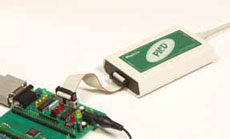| |
MSP-430 - In-Circuit JTAG Debugger / Programmer |
|
|
|
|
|
| |
The PICD-430 is a high-speed In-System Programming (ISP) and Debugging Tool which supports the popular Texas Instruments MSP-430 Microcontroller Family. The PICD-430 connects to the PC via a fast USB link and then connects to the JTAG port of the target MSP-430 device via a 14-way IDC ribbon cable.
The powerful debugger IDE which comes with the PICD-430 supports real-time run and single step program execution, breakpoints, and real-time tracing (tracing for some derivatives only). The software suite supplied with the PICD-430 includes: IDE, MCA-430 macro assembler, PDS-430 command set software simulator, editor and JTAG debugger.
A separate Target System is required for use with the PICD-430 - see Associated Products for further details. |
| |
|
|
|
 |
General |
|
- Supports the entire MSP430 family and future derivatives
-
High-speed programming of the target MSP430 device on-chip CODE memory
-
Supports debugging of the downloaded code in-situe
-
Code can be debugged on the real Target Device so all electrical / physical paramaters are as oer the real Target System
-
Fast USB communications link to the PC
-
Compace design
|
 |
Integrated Development Environment (IDE) |
|
- IDE shell with a project manager and MCA-430 macro assembler available at no charge
-
Integrates selected TP compilers (MCC-430 from MicroCOSM-ST and EW430 from IAR Systems) and provides project management for these tools.
-
TI MSP430 Flash Emulation Tool (MSP-FET430) can be hooked up to the system and featured by a C compiler and enhanced emulation & tracing functions
-
PDS-430 command set software simulator for all popular C compilers
-
Works under control of Windows 9x/ME/2000/NT/XP
|
 |
Powerful Debugger |
|
- High-level steps for C programs and low-level steps for assembly code
-
Supports up to 8 unconditional breakpoints at the address, or the range of addresses, in code memory
-
Supports up to 8 complex breakpoints / triggers on access to data memory - read, write or read/write, cycle type, internal bus event, register writes, etc.
-
Set triggers can be programmed to get a complex (AND, OR, and Sequential) condition for the program break or trace control
-
Easy-to-use graphical presentation for setting complex breakpoints/triggers lets you examine and modify internal resources of the target MSP430 MCU when execution is stopped
-
For some MSP430 derivatives internal clock can be enabled after the break so the target MCU will continue generate tact signals for an external LCD or other peripherals
|
 |
Trace Buffer |
|
- Trace buffer records 40-bit frames displaying real-time signals on the internal MSP430 bus: 16 lines of address, 16 lines of data and 8 controls
-
Depth of the trace buffer is defined by a particular MSP430 type (8 frames min)
-
Filtering and searching trace frames
-
Several tracing modes: forward (start on trigger, stop on the buffer overflow), reverse (start on command, stop on trigger) and dynamical (start on one trigger, stop on another)
|
 |
Interface to Target System |
|
- Interfaces to target MSP-430 device via a 14-way IDC cable (supplied)
-
Target System must have mating IDC Box Header
-
Connection details can be found in the application note in the Download Section
|
 |
PC USB Interface |
|
- Connects to PC via high-speed USB link
-
USB cable is supplied with the programmer
|
 |
Suggested Target Systems |
|
|
To provide real-time emulation, single step, breakpoints, flash programming and other operations via JTAG interface embedded into the MSP430 microcontrollers, PICD-430 in-circuit debugger must be connected to a target - a board with a MSP430 microcontroller installed on it. In most cases customers use their own prototipes with JTAG connectors installed on them for use with the PICD-430 or other JTAG debuggers. But sometimes a customer needs to get a simple board that can be used as a prototype. Popular TI's MSP-FET430 flash-emulation tools from Texas Instruments include such target modules with ZIF sockets allowing setting several MSR430 derivatives on on every one board. PICD-430 debugger can work with these TI's modules.
Phyton also offers a variety of the target boards from the company specialised in producing such type of products - OLIMEX Ltd . This company produces development modules for MSP430 microcontrollers, which can be used in a combination with the PICD-430 debugger - the company calls them "header boards". Each board carries one type of the MSP430 micro, a standard 2x7 pin JTAG connector that exactly fits a PICD-430 ribbon cable. The Olimex's boards take power from the the PICD-430 units. The target boards are very small (about 2" x 2" or 50 x 40 mm).
|
| |
| |
Device Support (by family) |
|
|
|
|
|
| This product supports devices from the families listed below: |
| |
Texas Instruments:
-
MSP430 Flash Microcontroller Family
|
| |
|
Please note:
Not all devices may be supported within a family.
Please see the Detailed Device Support List for a list of all devices which the product supports.
|
| |
 |
MSP-430 - In-Circuit JTAG Debugger / Programmer
High-speed Debugger / Programmer for the TI MSP-430 Microcontroller Family. USB hosted. Includes a USB cable, JTAG cable and a full software set: IDE, MCA-430 macro assembler, PDS-430 command set software simulator, editor and JTAG debugger.
| Quantity |
Price (GBP) [Excl. VAT] |
| 1 and above |
|
|
|
|
|  |


|